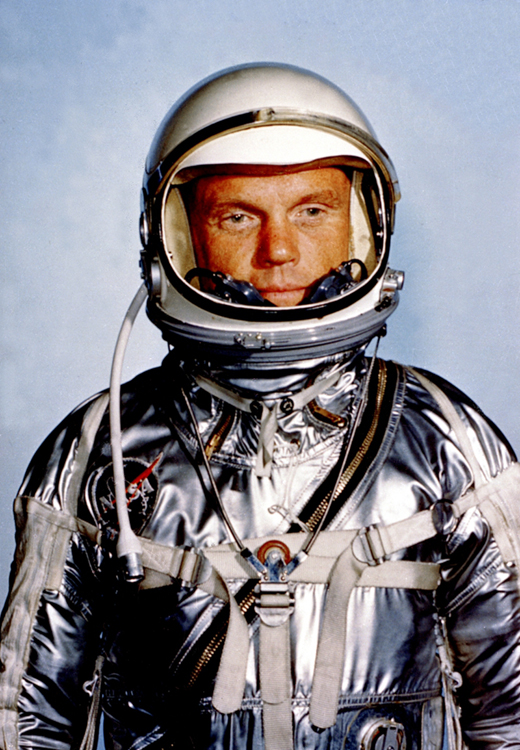Current Events Lesson Plan: December 8-14, 2016
Current Event: Space Age Hero John Glenn (1921-2016)
On December 8,United States astronaut and Senator John Glenn died in Columbus, Ohio, at the age of 95. John Herschel Glenn, Jr., was born on July 18, 1921, in Cambridge, Ohio. He became a pilot for the U.S. Marine Corps, serving in both World War II (1939-1945) and the Korean War (1950-1953). After the wars, he served as a test pilot for new supersonic aircraft, which travel faster than the speed of sound. In 1959, he was chosen to be one of the first seven National Aeronautics and Space Administration (NASA) astronauts. On Feb. 20, 1962, he became the first American to orbit Earth. (About 10 months earlier, Soviet cosmonaut Yuri Gagarin became the first human space traveler when he made one orbit of Earth in his spaceship.) Glenn orbited Earth three times during his historic flight. He was probably the first human being to “fly” a spacecraft manually for any length of time. During the flight, the autopilot malfunctioned, causing the spacecraft to tilt to the right. Glenn held the spacecraft in its proper position for the rest of the flight using the vehicle’s manual controls. After Glenn left NASA in 1964, he decided to go into politics. He won election to the Senate from Ohio in 1974, and he continued to serve as a senator until 1998. Glenn traveled back into space in 1998, aboard the space shuttle Discovery. Glenn was 77 years old at the time of the mission, making him the oldest person ever to take part in space travel. As a fighter pilot in two wars, an astronaut in two missions 36 years apart, and a senator for 24 years, Glenn leaves behind a towering legacy of service to his country matched by few people in U.S. history. His humility and patriotism impressed everyone he met. Glenn was an American hero, the likes of which may never be seen again.
Objective:
Mercury was the first United States project to send humans into space. It lasted from 1958 to 1963. The National Aeronautics and Space Administration (NASA) ran the project. In 1959, Glenn and six other men were chosen from 110 test pilot volunteers for the program. The first two Mercury flights were suborbital flights, quick up-and-down shots that did not orbit Earth. The first American astronaut in space was Alan B. Shepard, Jr., whose flight was on May 5, 1961. The second astronaut, Virgil I. (Gus) Grissom, flew on July 21, 1961. After roughly 15 minutes, both flights returned to Earth. On Feb. 20, 1962, John Glenn orbited Earth three times. Three more Mercury missions followed Glenn’s flight. The astronauts M. Scott Carpenter, Walter M. (Wally) Schirra, Jr., and Gordon Cooper each flew the same number or more orbits than the previous flight. NASA grounded Mercury astronaut Donald K. (Deke) Slayton because of a minor heart ailment. The Behind the Headlines news story and related World Book articles explore the astronauts of the Mercury program and other missions.
Words to know:
- Astronaut
- Gagarin, Yuri Alekseyevich
- Glenn, John Herschel, Jr.
- Mercury
- National Aeronautics and Space Administration (NASA)
- Ohio
- Senate
- Shepard, Alan Bartlett, Jr.
- Space exploration
- Space race
- Space shuttle
Discussion Topics:
1. Ask your students to name some famous astronomers and astronauts. (Students might name Buzz Aldrin, Neil Armstrong, Tycho Brahe, Eileen Collins, Nicolaus Copernicus, Yuri Gagarin, Galileo, John Glenn, Mae Jemison, Johannes Kepler, Christa McAuliffe, Sir Isaac Newton, Sally Ride, Carl Sagan, Alan Shepard, and Neil deGrasse Tyson.)
2. John Glenn served as a senator for 24 years and campaigned for the Democratic presidential nomination in 1984. Ask your students to name some of the 16 senators who later became president of the U.S. (The 16 senator/presidents in chronological order were: James Monroe, John Quincy Adams, Andrew Jackson, Martin Van Buren, William Henry Harrison, John Tyler, Franklin Pierce, James Buchanan, Andrew Johnson, Benjamin Harrison, Warren G. Harding, Harry S. Truman, John F. Kennedy, Lyndon B. Johnson, Richard M. Nixon, and Barack Obama.)
3. Private companies have begun launching people into space. Ask your students if they would want to visit another planet or any other celestial body. Assuming they could safely travel anywhere in space, where would they go? Would they go if they knew they could never return to Earth?
4. Ask your students to use World Book’s Timelines feature to view or add to the Advances in Space Exploration timeline. (Students may wish to use World Book’s “Space exploration” article for help.)



